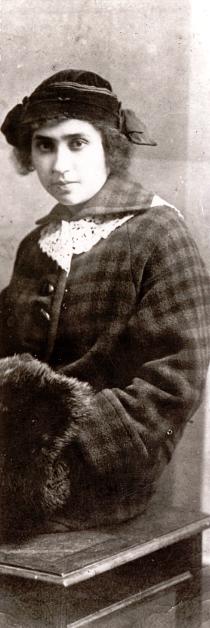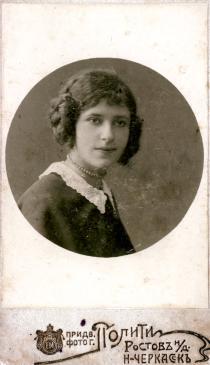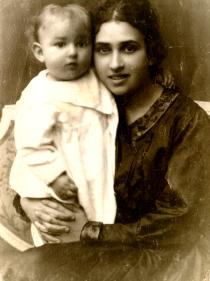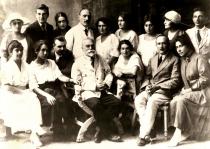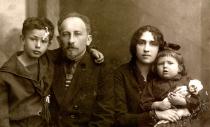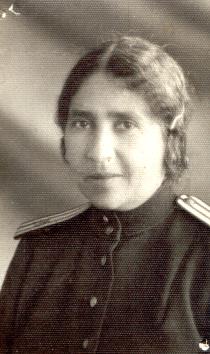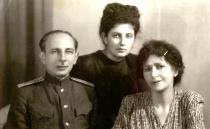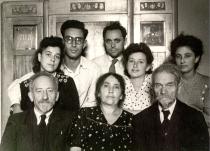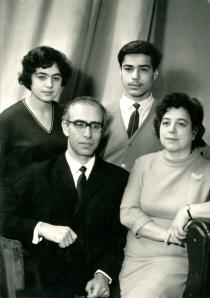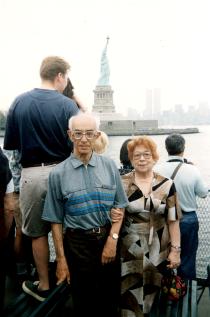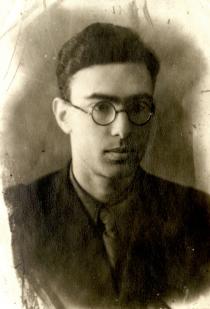
Isaac Gragerov
Kiev
Ukraine
Interviewer: Zhanna Litinskaya
Date of interview: November 2002
My family background
Growing up
My school years
During the war
My wife Zhenia
Our children
Glossary
I know very little about my grandparents. My grandfather on my father's side, Abram Gragerov, was born in the 1850s. I have no information about his place of birth or his parents. According to the documents that my father had, my grandfather changed his first name and surname to Alexandr Anisimovich. I've no idea why he did that. Family legend has it that grandfather Abram came to Odessa when he was a young man of about 16 years of age. He had no belongings other than a small bag with some food. Thanks to his hard work, and probably some luck, my grandfather became a respectable and known man in Odessa. By the end of the 19th century he owned an apartment building. He lived with his family in one apartment of this building. Besides, my grandfather held a very important position as an adjuster in Odessa port. He had a good salary and income from his tenants and provided well for his family. Abram often went to the theater, restaurants and taverns, and many very important people were his friends. He made significant contributions to the synagogue where he had a seat. But he wasn't very religious and only went to the synagogue on the major Jewish holidays. They observed the main Jewish traditions in his family. They celebrated Shabbat and all Jewish holidays, but they didn't pray. It was more a tribute to tradition than their true faith. My father told me that they didn't really follow the kashrut either.
My grandmother on my father's side, Feiga Gragerova, was the daughter of a local merchant. I don't know her maiden name. I only know that she had a good education for the time - she was educated at home. My grandmother was a housewife. She had a housemaid and a kitchen maid.
Abram and Feiga had 13 children, and my father was the youngest. Their first boy died of smallpox in infancy; the rest of their children lived a long life. There's a story I heard about my grandfather. He used to give his children Biblical names: Isaac, Jacob, Esther, Sarah and Ida. Somebody asked him once, 'Why do you give your children old Jewish names? That's so old-fashioned'. My grandfather laughed and said, 'Well, the next ones will have Russian names', and, indeed, his other children were named Alexandr, Peter, Anna, Nina and Nadezhda. He probably demonstrated his progressive views and independence from patriarchal principles of the old times this way.
The oldest child was Isaac, born around 1875. At the beginning of the 20th century he moved to America, where he managed to get a good education. He became a chemist, a specialist in explosives. I only saw him once when, in 1937, Isaac and his wife - (they didn't have any children) - visited his brothers and sisters in the Soviet Union. I don't know how he managed to come here. I saw him for a couple of hours. In 1948 Isaac provided assistance to Israel in manufacturing explosives. He lived in Israel for a long time and made a significant contribution to the establishment of this young state, in which weapons and explosives were in need because of its hostile surrounding. In the early 1950s, when anti-Semitism in our country was at its height, my parents were concerned1 about receiving letters from America and stopped corresponding with Isaac. [The authorities could arrest an individual corresponding with his relatives abroad and charge him with espionage, send him to concentration camp or even sentence him to death.] I never saw him again and don't have any information about how he was doing.
The next child after Isaac was Jacob. Jacob finished navy school and became a captain. During World War I he was commander of a warship. In the first few years after the Revolution of 1917 1 Jacob lived in our family. He was single. Later he went to work in the North and had a job on a ship in the estuary of Kolyma. Jacob spent his last years in Moscow. He died around 1938.
The next child in the family was Solomon, born in 1878. I don't know anything about his education or occupation. He lived in Moscow and never visited us. He was single and died in the 1930s.
The next son, Alexandr, was born around 1888. He had a higher engineering education. During the Revolution he became a member of the Bolshevik Party. During the Soviet period he was Chairman of GUTAP [Auto tractor industry department]. He had a wife and two daughters, and they lived in Moscow. In 1937 [during the so-called Great Terror] 2 he was arrested and vanished2. His wife was arrested, too, and their daughters also disappeared. They were probably sent to children's home for children of 'enemies of the people'. We took an effort to find them, but couldn't get any information about them. They might have had their names changed, which was a common practice in Soviet children's homes.
I don't know exactly when my father's sisters were born. Their names were Esther, Sarah, Ida, Anna, Nina and Nadezhda. There was one more sister, but I don't know anything about her.
Esther and Ida were married and lived in Bessarabia 3. I have no information about their life after the Revolution of 1917. I only knew Sarah. She was married. Her husband, Grisha Saksaganskiy, a Jew, was an invalid and died young. Sarah died before the war. Their older daughter, Shura, died of tuberculosis when she was young, and their younger daughter Lisa was in evacuation and got married after the war.
My father's sister Nina was born around 1889. She got married to Zinoviy Zimin, who came from Siberia. He worked as a logistics specialist during the Soviet period. During the war Zinoviy, Nina and their daughter Lilia were in evacuation. Nina died in the middle of the 1970s, and Lilia and Zinoviy moved to the US in the late 1980s. Zinoviy died in Chicago in the late 1990s at the age of approximately 110.
Anna was born around 1890. Her husband was a Lithuanian Jew, and his surname was Entelis. Their family lived in Moscow, and he worked as a lawyer in a ministry. Anna died in the middle of the 1960s. They had two children: Sergey and Tania. Sergey became a chemist, a Doctor of Science, and lectured at the Moscow Physic-Technical Institute. Sergey, Tania and their children live in Moscow.
My father's sister Nadezhda was born in 1893. She wasn't married and worked as a conductor for the railroad. She lived in Odessa and died a long time ago. This is all the information I have about her. None of my father's brothers or sisters was religious. They didn't observe any traditions or celebrate holidays. All of them, except for Isaac, became Soviet patriots and internationalists. They spoke Russian and didn't care about their nationality.
My father, Peter Gragerov, was born in Odessa in 1891. All children in my father's family received primary education at home. After that my father finished a commercial school, and when it was time for him to think about higher education, his father decided to send him abroad. It was difficult for a Jew to get higher education in Russia due to the 5 percent quota 4. My father's parents were wealthy enough to afford to have their children educated abroad. I don't know why my grandfather decided to give my father education abroad. He was the only one that studied abroad; he was probably more intelligent than the others. So my father went to Paris to study at the Institute of Aarts and Chrafts. He graduated from the Faculty of Chemistry with honors. He kept the medal he was awarded for his successful studies for many years. He lived in a hostel in the very center of Paris. He had many friends that were mostly students from Russia. Most of them were Jews. My father also met a beautiful Jewish girl, Raissa Gurvich, my future mother, and fell in love with her.
My mother's parents, Boris and Cecilia Gurvich, lived in Rostov-on-the-Don, an industrial and cultural town in Russia [900 km from Kiev], outside the Pale of Settlement 5. The majority of the town's population was Russian, but there were also Jewish families there. My grandfather, a merchant of Guild I 6, owned a garment store and a tailor shop. The family lived on the second floor of the same building in a beautiful apartment. My grandparents had two children: my mother Cecilia and her sister Bertha. Their parents could afford to give them a good education. Although they were not very religious, my grandparents tried to keep and observe Jewish traditions and celebrate Jewish holidays. They also followed the laws of kashrut. On Saturdays my grandfather's store and shop were closed. He didn't work on this day.
My mother's sister Bertha, born in 1900, studied at the Odessa Polytechnic Institute and became a chemist. Her husband, Michael Serper, was a doctor, a specialist in skin diseases. During the Great Patriotic War 7 he was at the front. Bertha and her daughter Valia were in evacuation. After Michael demobilized from the army their family lived in Zhytomir for many years. Valia died of cancer when she was young, and Bertha died in 1980.
My mother, Raissa Gragerov, finished grammar school in Rostov and left for France to continue her studies. She studied in Rouen for a year or two, and in 1913 she moved to Paris where she met my father. They dated for a year. They went to theaters, museums, small cafes and restaurants in Monmartre, enjoyed themselves and had no thoughts about returning to Russia. My father was going to study science in Paris, and my mother wanted to get education in order to become a doctor.
But at the beginning of World War I, in the summer of 1914, my father and mother immediately left for Russia. It took them a long time to get to Russia, whereupon my father went to his family in Odessa, and my mother went back to Rostov.
My parents didn't see each other for two years. My father was helping his father. My mother did her 3rd year at the Medical Institute in Rostov-on- the-Don and graduated in 1916. I believe my father went to Rostov to propose to my mother. All I know is that they got married in the fall of 1916. They had a wedding in Odessa. Although my parents were atheists, they gave in to their numerous Jewish relatives and had a traditional Jewish wedding with a chuppah, even though there were only the closest relatives and friends at the wedding.
My parents lived in my grandfather Abram's apartment in Odessa. One month before I was due my mother went to Rostov. She felt safer having her mother close to her. I was born in Rostov on 14th October 1917, a few days before the Revolution. My grandparents convinced my mother to stay in Rostov. When I turned 1 year old my father came to Rostov to pick up mother and me and take us to Odessa. My grandfather Abram was very upset about the new political regime. He understood that he was going to lose his property and riches. He started having heart problems and then suffered a heart attack. He died at the end of 1918.
My first memories go back to 1920 when my mother, who had a strong will and character, decided to visit her family in Rostov. It was the time of the Civil War 8 in Ukraine and the debauchery of gangs robbing and murdering passengers on trains. My father was begging her to stay but she got on the train to Rostov-on-the-Don anyway. There were no bandits, but something else happened. I had a high fever and diarrhea on the train. Other passengers were afraid of cholera - (there was an outburst of cholera in Russia at that time) - and decided to force my mother to get off the train at the next stop. That's what I remember: my mother crying, other people yelling and a kind man bending over me. He was a doctor, stood up for us and didn't allow these people to throw us off the train, where we would have fallen prey to bandits. The doctor explained to the passengers that the temperature gets lower in the course of cholera and that I had very high fever. It turned out that I had dysentery. We got off in Kharkov where my grandfather's relatives on his mother's side lived. Their family name was Kovarskiy. I loved my great-grandmother Kopochka. She was a plain woman and had no education, but she was so kind and nice. She looked after me and gave me food when I was on my way to recovery. The Kovarskiy family was a poor family, but they treated us with warmth and shared what they had with us. We lived in Kharkov until I recovered, and then we returned to Odessa. Unfortunately, I never saw these people again. My mother told me that their family was killed by the fascists in 1941.
By that time my grandfather's property became the property of the state. My grandfather had three rooms in his apartment left for his family, and the remaining three rooms were given to other tenants. I have vague memories about our neighbors in this apartment: two rooms were occupied by the family of a worker, and the third room was occupied by a woman who participated in World War I.
In the first years after the Revolution my father began to work at the leather and shoe factory in Odessa. He was an engineer at first and later was promoted to technical director.
My mother also had a job. She graduated from the Medical Institute and took to science. She got a job at the Glavchi Scientific Research Institute for Skin and Venereal Diseases. There's a photo which shows my mother with her colleagues of the laboratory. Their laboratory was supervised by an outstanding scientist, Peter Lazarevich Brodsky. My mother and father spent a lot of time at work. My grandmother Feiga lived with us for some time before she went to live with her other daughter. Feiga died in Moscow in the middle of the 1930s. When I was 5 years old, I joined a group of children who were taught by a Froebel tutor, (a young lady, who had finished a Froebel Institute 9). There were five or six children of my age, and we studied French and the names of trees and flowers.
In 1924 my younger sister Asia was born. Soon afterwards my mother's parents moved from Rostov to Odessa. They settled down in an apartment on the lower floor of the family's building. It was very convenient.
My mother and father were devoted to their work. My mother went to work soon after Asia was born, and my grandmother Cecilia looked after the baby. My sister and I spent a lot of time with our grandmother. She told us about Chanukkah, on which children get sweets and money, the taste of matzah and all the other delicious food that she made at Pesach. My grandmother also told me about the other holidays and traditions. I wasn't really very interested in them, but I enjoyed eating the delicious food. My grandparents went to the synagogue on holidays. We didn't go with them. Our parents didn't allow them to involve us in any religious activities. My parents weren't religious. They considered religious convictions to be a thing of the past, although they weren't members of the Communist Party. My parents didn't even speak their mother tongue - Yiddish - at home. They only spoke Russian.
My mother graduated from the Medical Institute and took to science. She got a job at the Glavchi Scientific Research institute of skin and venereal diseases. There is a photo where mother is photographed in the group of employees of the laboratory headed by Peter L. Brodskiy, a scientist. My mother and father spent a lot of time at work. My sister and I spent a lot of time with our grandmother. She told us about Chanukah when children get sweets and money, the taste of matsah and all delicious food that my grandmother made at Pesach. My grandmother also told me about the other holidays and traditions. I didn't show much interest in them, but I enjoyed eating delicious foods. My grandparents went to synagogue on holidays. My parents were not religious. They considered religious convictions to be vestige of the past, although they were not members of the Communist Party. My parents didn't even speak their mother tongue - Yiddish - at home. They only spoke Russian. In 1924 I began studying at a Russian lower secondary school). There were pupils of various nationalities, but we were all friends. We had very good teachers. I became a pioneer and was very proud to wear my pioneer red necktie. We went in for sports, collected waste paper and scrap and spent our summer vacations at the sea.
In 1930 our family moved to Moscow. My grandparents stayed in Odessa. They were supposed to join us as soon as my parents had settled down. My father couldn't find a good job in Moscow, and we stayed there for about half a year. I felt some hostility from my classmates at school in Moscow. They didn't socialize with me, and when I asked why, they told me that I was different from them. There were no other Jews in our class, and I understood what they meant.
After half a year my father got a job assignment with a leather factory in Berdichev [a small town 200 km from Kiev]. He became chief engineer there. The majority of the population was Jewish. There was a very warm atmosphere in town. There were almost patriarchal relationships between the inhabitants of the town. People spoke Yiddish in the streets. Even Ukrainians spoke fluent Yiddish. Synagogues were closed by that time, but before 1917 there were over 20 synagogues in Berdichev. In spite of this fact, Jews observed Jewish traditions strictly. On holidays they got together near the synagogue in a room. All of them dressed up to watch merry Purimshpil performances. At Chanukkah people danced and sang in the streets. I didn't know any details about these holidays, but I enjoyed the atmosphere.
I studied in a Russian secondary school, where most of the pupils and teachers were Jews. After school my friends and I took a walk in town, admiring a Christian church and a synagogue. Many boys went into the synagoguewith little caps on their head. It was natural for them because their families observed all Jewish traditions. I didn't dare to go inside the synagogue. I believed that only a person with true faith could go in there.
In 1932 we returned to Odessa. My father became director of sscience at the rResearch Iinstitute of Lleather and Ffootwear Iindustry. My mother returned to her laboratory at the institute. I became a Komsomol 10 member at school. Later I went to high school where I completed my secondary education.
We received an apartment in the house next to our grandfather's building. During the famine of 1932-33 [the famine in Ukraine] 11 we were in Odessa. We didn't have enough food. Sometimes my sister and I got little buns at school that were a delicacy. The situation in our family was less acute - my father received food packages at work. Many people starved to death. I remember seeing a dead woman on the stairs of our grandfather's former building. I also saw people dying in the streets, and their corpses were removed at night.
In 1934 the affiliate of my father's institute in Odessa was closed, and my father was transferred to Kiev where he became deputy director for scientific work at the Ukrainian Lleather and fFootwear Iinstitute. The institute was located within the area of the leather factory. We received a three-bedroom apartment in the same area.
After finishing school I submitted my documents to the Kiev State University. I wanted to become a chemist, but in 1935 there was no admission to the Faculty of Chemistry, and I decided to enter the Faculty of Physics. I failed at the exam in Russian and Ukrainian composition. I entered the Faculty of Chemistry at the Institute of Leather and Footwear Industry located near the leather factory. I was more interested in scientific research than practical applications and, after a year, I managed to enter the Faculty of Chemistry at Kiev University.
I was very fond of chemistry. I was also involved in public activities, and at one time I was head of the Komsomol unit of my course and a member of the Komsomol committee of the institute. I collected monthly fees, conducted meetings, concerts and amateur artist contests. I also met a nice Jewish girl called Zhenia Kriss. We went to theaters and concerts. We all celebrated 1st May and October Revolution Day 12 together, went to parades, got together at somebody's place, danced and partied until late, recited poems and sang Soviet songs.
There were many, many arrests in the 1930s [during the so-called Great Terror]. A few lecturers and students of the university vanished. There were portraits of devoted revolutionaries in the concert hall of the university. Many of these portraits vanished, after these people were accused of betrayal and executed. There were portraits of Kamenev 13 and Zinoviev 14. Many other dedicated and devoted communists vanished in those years. Many of my father's friends and acquaintances disappeared. My father's brother Alexandr was arrested and vanished. My father had a feeling that they were coming for him one night. Of course, my parents understood the real situation, but I believed that all these arrests had their reasons, and that all those people were indeed 'enemies of the people'. My parents didn't try to tell me otherwise, but they often discussed how unfair the situation was.
In 1940 I graduated from university with honors and entered the post- graduate course at the Academy of Sciences. My scientific tutor was Professor Yavorskiy, who lectured on the subject of organic chemistry.
We knew about Hitler and fascism and what they did in occupied areas from newspapers and radio broadcasts. Although people were preparing for a war - (we had training for air raid alarms and all kinds of other training at the university -) the war came as a surprise.
I remember air raids in Kiev on the first day of the war on 22nd June 1941. Then we heard Molotov's 15 speech about the war. My mother was very worried about me every time I left home. Once I saw an air raid over Podol 16 where German planes were shooting at people in the streets. Soon I was recruited to the army. We, young raw recruits, were sent to support the evacuation of a military storage facility located near the Lavra (Monastery). We packed and loaded weapons and equipment onto railcars day and night. We slept at the storeroom and had meals at the canteen near the shoe factory. Later we were ordered to march to a training camp. On the way I turned to the village of Lemeshovka because I knew Zhenia Kriss was there. She was among the students that had been sent to harvest crops. I don't remember how long I walked, but I found Zhenia. I didn't quite realize why I was so attracted to this nice girl, but I said good-bye to her knowing that it might be the last time that I saw her. Then I went to catch up with my military unit when I was stopped by some partisans. They must have taken me for a spy. They didn't listen to my explanations and told me to follow them. We were in the field when I saw some military marching. It was my military unit, and the convoy let me go.
Our training camp was in the village of Orsha, in Sumskaya region [400 km from Kiev]. We were there for about a month learning military techniques, although we didn't have any weapons, uniforms, shells or bullets. I managed to shoot once before we were sent to the front. Our unit was deployed near Kiev, where we were to participate in the defense of the city. I remember my first battle on 16th September [1941] when I felt something hitting me on my head, and I fainted. I came to my senses in hospital in Kharkov. I couldn't move my left arm and leg. I knew that my parents were supposed to evacuate to Kharkov with my father's institute. I asked a nurse to find out whether my parents were there, but she lied to me saying that she had been to the institute, but my parents weren't there.
Kiev was occupied and the German army was approaching Kharkov. The hospital evacuated to Baku. Wwe were put on the train when the bombing began. After the bombing the train with survivors and personnel departed for Baku. I stayed at the hospital in Baku until the end of 1941 and was discharged on New Year's Eve. The doctors did their best. Although I still have problems with my arm and leg, I believe I was lucky. Even though I became an invalid I survived, and that's the most important thing. During my stay at the hospital I wrote to my father's sister Ania in Moscow, and she wrote back telling me that my parents were in evacuation in the town of Khrompik in Sverdlovsk region [2,500 km from Kiev].
At the beginning of January 1942 I knocked on the door of the room where my parents were staying. They didn't have any information about me, and my mother feared the worst. Ania's letters never reached them. She was so happy to see me. As to me, I think I was lucky to return alive although I actually didn't even take part in my first battle.
Khrompik was a small town where my father's institute was evacuated. My parents occupied a room in a communal apartment. After I came there were four of us: my father, my mother, my sister and I. Life was hard, and we didn't have enough food.
Sometime after I arrived we received a letter from grandmother Cecilia from Kazan. She wrote that grandfather and she evacuated to Northern Caucasus, from where they went to Stalingrad and then took a barge up the Volga. My grandfather fell ill with dysentery. A few days after they got off in Kazan he died. My grandmother was staying in hospital and asked us to come and pick her up. My mother and I went to Kazan and brought her to Khrompik, but my grandmother was so affected by her husband's death that she was ill for several weeks and finally died.
My mother suffered a lot over her parents' death. She went to work at the hospital to get distracted from her sad thoughts. I decided to continue my studies and attended a post-graduate school at the university in Sverdlovsk where chemistry professors from Moscow were working at the time. Since I didn't have any documents with me, I went to Ufa where the Ukrainian Academy of Sciences was in evacuation. I found my scientific tutor Professor Yavorskiy. He helped me to obtain the required documents. I studied in Sverdlovsk for over a year. At the end of 1942 the front moved to the West, and the professors moved back to Moscow and called me to come there. I arrived in Moscow at the beginning of 1943.
In the middle of 1943 the hospital where my mother was working moved closer to the front and became a mobile front hospital. In 1944 I visited my mother in the vicinity of Smolensk. She became an experienced surgeon, had the rank of major of medical service and received many awards.
I finished post-graduate school in 1946. I corresponded with Zhenia throughout the war. In 1946 I returned to Kiev and found Zhenia Kriss through her passport. Shortly afterwards we got married. We had a civil ceremony. We didn't even have rings. We just had our close relatives and friends at our small wedding party.
Zhenia was born in Kiev in 1920. She came from a Jewish family that wasn't religious. Zhenia finished a Russian secondary school. We were students at the same institute, only in different years. During the Great Patriotic War she was in evacuation in Middle Asia. She returned to Kiev in 1946 and became a senior lab assistant at the Chair of Organic Chemistry of the Silicate Institute. She defended her thesis in 1956. She had many publications and students. They prepared their theses under her supervision. In 1966 Zhenia became a junior scientific employee. Later she was promoted to the position of a senior and then a leading scientific employee. She prepared five candidates of science. She worked in a new field dealing with the development of new medications. My wife retired in 1997 when she turned 77. Her former students still call her and come to see her to have discussions or ask for advice.
After the war my parents received an apartment from my father's institute, located near the leather factory in Kiev. My wife and I also lived in this apartment until we received our own apartment in Pushkinskaya Street in the city center.
It took me some time to find a job in Kiev. I don't know whether it had anything to do with my nationality, but this issue was resolved through the Ukrainian Academy of Sciences. Alexandr Brodsky, a Jew, was the director of the Academy, and he helped me to get employment. I believe it was thanks to his efforts that the 'campaign against cosmopolitans' 17 and the Doctors' Plot 18 in the early 1950s bypassed our institute. The only thing the authorities could do was to fire quite a few Jews on the basis of an order, which said that no married couples or their relatives were allowed to work with the same company. These campaigns didn't affect me personally. When Stalin died in 1953 I couldn't hold back my tears, although I was a very reserved person. My mother was crying aloud.
My father didn't work any more. He had heart problems and died in 1954. My mother lived with us for a few years. In the early 1960s a friend of hers, who had been in love with her a long time before that, found her. His name was Ilia Berlin. He was a Jew. His wife had died soon after the war, and Ilia proposed to my mother. She accepted his proposal, and they moved to Moscow. I believe my mother had a happy life with him. She died in Moscow in 1985.
My sister Asia graduated from the Kiev Engineering and Construction Institute and became an architect. She married a Jewish man, Vladimir Kriksunov. Asia and her husband showed a lot of interest in Israel and the Jewish way of life. In the late 1980s they moved to Israel with their children, Leonid and Peter. Asia's husband died there. Asia works as an architect.
I was a convinced communist. I became a member of the Communist Party during the war. I wasn't involved in any activities, but I believed it to be my duty to be among the 'builders' of communism. My faith was shuttered by the Twentieth Congress 19, which denounced the cult of Stalin. I realized then how much injustice and lies there were in our life, and that so many innocent people suffered from the Party in which they believed.
I've had a good life. I had work that I liked. In 1970 I defended my doctoral thesis. I studied the mechanism of chemical reactions all my life. I had students that defended their thesis, and I can say that I established my own school. I retired when I was 73.
I've been happy in my personal life, too. My wife and me are very close and very much in love with one another. We always liked to celebrate Soviet holidays. We've had friends of various nationalities. We liked to get together and sing beautiful Soviet songs. We've read a lot and went to the theatre, art exhibitions and concerts.
We have two children: our daughter Irina, born in 1948 and our son Alexandr, born in 1953. They were not raised Jewish, but they have always identified themselves as Jews and are proud of it. I can't say that either of my children directly faced anti-Semitism. They both went to study in Moscow, because at that time it was practically impossible for a Jew to enter higher educational institutions, especially the university, in Kiev.
Irina entered the Faculty of Chemistry of Moscow State University. Upon graduation she returned to Kiev. She met Yuri Malitin at university, a Jewish man, a very nice and decent young man. They soon got married. Irina and Yuri work and live in Kiev. They have two children: Andrei graduated from the Biological Faculty of Kiev University, and Alexandra is in 10th grade of school at the Kiev Polytechnic Institute.
Our son Alexandr graduated from the Faculty of Biophysics at the Moscow Institute of Technical Physics. He became a specialist in molecular genetics and defended a thesis for Candidate of Science. In the 1990s Alexandr went to work in America. He worked in New York, Chicago and Washington. Now he lives in Seattle and is head of department, working on the development of new medications. Alexandr's wife is an architect. Their daughter Masha studies at an art school. She had her own exhibitions, and she dreams of becoming a designer.
I know that the Jewish community in Ukraine is reviving. There are books and newspapers published. There are charity organizations. Synagogues are open. I find it all wonderful. I don't attend any of these. We've never celebrated any Jewish holidays - we were raised that way. My wife and I often go to theater, read a lot, meet up with friends and look after our grandchildren. Our grandchildren often come to see us.
I have been in Israel visiting my sister Asia and in America visiting my son. I admire the many advantages of developed countries, and I also admire Israel and the struggle of the people for their country, but I remain a Soviet citizen. I shall never leave my country. I've been lucky in my life.
